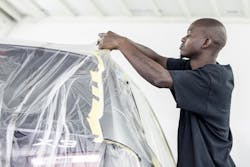Even on the worst of days, when nothing seems to be going right and she’s overwhelmed, Kate Fox knows one smile will cure everything.
“He’s got these big, pearly, perfect, white teeth and you just can’t help but smile back,” she says. “He’s just a breath of fresh air.”
That smile belongs to Douglas Sebowa.
A refugee hailing from Uganda, Sebowa, 28, traveled to America and eventually found his way into the Boston shop, which is part of DCR Systems, a company that sets up turnkey collision repair facilities for dealerships.
Keep in mind: Sebowa had zero body repair experience prior to January 2016. When he sat down with store leader Tim Johnson for an interview, Sebowa—now the shop’s production support technician—had never disassembled a vehicle, applied primer, picked up a paint gun, or even pulled a dent out of a hood.
Yet, if you ask Johnson about hiring Sebowa?
“It’s the best investment we’ve made at the shop,” Johnson says. “That’s the type of thing you can’t plan for: Somebody comes in the shop and has this willingness to learn, and the other guys see that and feed off it. Those are the types of people that want to grow and earn more responsibility. To see somebody that is going out there and grabbing the bull by the horns, you don’t want to let that person pass them by.”
Michael Giarrizzo Jr., CEO of DCR Systems and the man who discovered Sebowa, couldn’t agree more. In fact, he thinks Sebowa’s story serves as a lesson for the entire collision repair industry.
“If we start thinking a little different about the way we do work, I think the door opens wide for people that don’t have industry experience or aren’t mechanically inclined,” he says, “especially when you have other experienced people to teach them in a very structured manner.”
Gallery Collision Center
Location: Norwood, Mass.
Size: 12,000 square feet
Staff: 14 (5 technicians, 3 preppers, 3 administrative, 1 painter, 1 detailer, 1 store leader)
Average Monthly Car Count: 85-110
Annual Revenue: $3–$4 million
a Crisis
In Uganda, Sebowa and his friends had a saying:
“Fake it until you make it.”
He laughs about it now, but most of his life, that phrase had been pretty essential: for money, for food, for survival. Sebowa had to perform whatever work was thrown his way as a youth.
Which, for many years, included automotive repair.
“My friends and I would buy used car parts all the time. People would need us to put parts on their cars, so I would go help them with that,” he says. “But I didn’t have a lot of experience. So I would say I could fix their cars, and then just learn from other people. I’ve always wanted to learn more and get new experiences.”
While Sebowa recalls his childhood and teenage years with fondness, as the years have passed, conflict between surrounding nations has resulted in a very different societal landscape. More and more people have fled from violence and human rights infringements in South Sudan, Burundi and the Democratic Republic of Congo and into Uganda, whose refugee population grew from 421,000 to 513,000 over the course of 2015, according to the United Nations High Commissioner for Refugees.
The political unrest it has caused in his home country led Sebowa to seek refuge through the United Nations, eventually landing him in the U.S. Incessantly searching for work—as he’s always done—he called dozens of students who had attended mission trips in Uganda, and eventually connected with someone who knew Michael Giarrizzo Jr.
a Vision
As the former vice president of Sterling Auto Body Centers, Giarrizzo helped grow the company to 65 stores employing 1,300 people across 10 states by implementing lean process models, focusing on driving down cycle time, and establishing team-based systems.
But above all else, he says he did it by investing in employees.
“We set ourselves apart by caring about the growth of our employees,” Giarrizzo says. “We structured a career path for them to be successful.”
He kept that mentality when he formed DCR Systems in 2004. Today, at seven different collision centers, the company employs 115 individuals—half of which are homegrown. Customer service representatives have gone on to become administrative leaders; apprentices have turned into lead structural technicians; one detailer is now a store leader.
“I told him, ‘I can do anything as long as you give me the opportunity to do it,’” Sebowa recalls.
And Giarrizzo didn’t hesitate one bit.
A System
Tony Matthews remembers the first day he met Sebowa with absolute clarity.
“He’s got this spiritual walk about him,” says Matthews, master painter for Gallery Collision Center. “He’s just very friendly and easy to talk to. He learns really quickly and wanted to learn from the get-go.”
While his shop receives training from AkzoNobel and 3M, store leader Tim Johnson says the DCR “growing-from-within” mentality involves pairing new hires with experienced employees like Matthews, who coach and guide newbies like Sebowa through the shop’s lean processing model. So, on the first day, Sebowa was instructed to offer extra help and wash cars.
The second day? He stepped over to disassembly and started asking questions. Before Matthews and Johnson knew it, Sebowa was balancing washing, disassembling and performing any extra help needed around the shop.
“It was immediately apparent he would do whatever it took to help the shop,” Johnson says. “He wanted to learn to paint, do assemblies, do disassemblies, perform metal work. He wanted to work his way up.”
That drive to learn and take on more and more responsibility is paying off for Sebowa, who was quickly promoted from extra help to product support technician. He provides relief in all departments, spending most of his time priming vehicles. And whenever there’s downtime, he heads into the paint booth with Matthews to work on his refinishing skills.
“The beauty of it all is that DCR fosters an environment that promotes that attitude,” Johnson says. “Because we’re an hourly shop, when time or opportunities present themselves, we can take the time to build talent at the store.
“That also brings up other people, because they feel the need to pick up their level of work to stay with it. There’s a lot of camaraderie that comes from somebody who walks over and asks what you need help with. That type of attitude spreads like wildfire through a shop.”
Giarrizzo is heavily invested in quenching Sebowa’s desire to grow as a technician and has twice flown the green employee to DCR’s Mentor, Ohio, facility, where Sebowa has been taking classes and is working his way toward achieving ASE Master certification by 2017.
“Young people are like sponges. They learn quickly,” Giarrizzo says. “And if we don’t compensate them for their skills, somebody else is going to. Then all the sudden, we become the minor league team for somebody else. And that’s not what we want to do. We want to create career people.”
A Team
“Even in 90-degree weather, he makes sure I have hot chocolate brewing,” she says of Sebowa, laughing.
“He has an unhealthy obsession with hot chocolate, really,” Johnson chimes in.
Sebowa’s quirks and good nature have not only resulted in a livelier, more fun, familial shop environment, Johnson says, but have filtered into the employees’ lives. One of the shop’s lead technicians gives Sebowa—who is now set up in a Boston apartment—a ride each morning, and Fox and her fiancé happily drive Sebowa to church each Sunday.
“He comes to breakfast or lunch with us afterward,” she says. “My fiancé actually spends a lot of time with him outside of work. They’re inseparable at this point.”
Sebowa truly enjoys brightening everyone’s day and thrives off the energy of the new shop culture. He feels a sense of loyalty to the shop, which gave him a chance when he didn’t know where to go.
“It’s almost like a family here,” Sebowa says. “At first I was very scared because I didn’t know anything. But then everyone was trying to show me how to do it right.”
“We just embraced him with open arms,” Matthews adds. “He was overwhelmed by all of the support he had. We took him in as a family.”
For Giarrizzo, the return on investment isn’t even calculable. When you invest in work ethic and drive, anything is possible, he says.
“It’s opened all of our eyes,” Giarrizzo says. “Some people look at it and say, ‘Wow, you really helped him out and gave him an opportunity.’ And that may be so—but it’s actually worked in reverse. The payback has been immeasurable.”
Attracting Talent for Life
DCR Systems CEO Michael Giarrizzo believes strongly in building employees from within and creating an environment where they want to work for life. Here’s how he does it:
Pay for tools. Combine college debt with the difficulty of finding an entry-level job, and it’s understandable why many technicians aren’t heading into the trade of collision repair. Giarizzo’s solution? Make it easier by offering tool allowances, or by flat-out paying for technicians’ tools or toolboxes.
Record training videos. When DCR Systems shops train new employees, they use it as an opportunity to film some training videos for future new hires. “So it’s not just some Powerpoint. They can actually see and feel it on one of our shop floors,” he says. “They cover everything, from the time we greet the customer through the repair process to the delivery process. “We’re now at 30-plus videos, and we’re continuing to make them. We’re really trying to simplify the whole thing, attract people, tell them there is a career path here.”
Hire apprentices. It’s a common answer to the technician shortage, but Giarrizzo says it cannot be stressed enough: Start an apprenticeship program. It’s one turned one of Giarrizzo’s shop’s detailer into a store leader.
For tips for an effective apprenticeship program, check out some of our past coverage:

